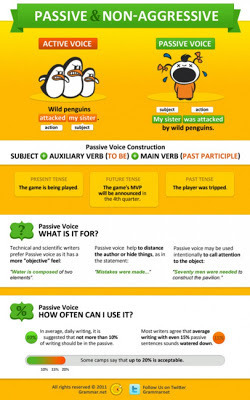Passive vs. Non-Aggressive Voice
I love a good info-graphic, and this one is a good follow-up to my last post, in which I lamented the shortcomings of using the passive voice. Sometimes that "be" verb is necessary, but often—usually—it can be replaced with action verbs that draw a reader happily to the conclusion of a book. Hopefully, he'll have a smile on his face and look slightly disheveled after the thrilling experience...
 Courtesy of grammar.netThe subject is continued if you want to further investigate Filter Words, which "unnecessarily filter the reader’s experience through a character’s point of view." (Dark Angel, author of the now defunct Dark Angel Writing and Reviews.com) What do filter words look like? They are often sensory words such as the following:
Courtesy of grammar.netThe subject is continued if you want to further investigate Filter Words, which "unnecessarily filter the reader’s experience through a character’s point of view." (Dark Angel, author of the now defunct Dark Angel Writing and Reviews.com) What do filter words look like? They are often sensory words such as the following:
to seeto hearto thinkto touchto watchto lookto feel (or feel like)They aren't limited to just those, however. That would be far too simple, right? Suzannah Windsor Freeman goes into more depth in her excellent, bookmark-worthy article, Are These Filter Words Weakening Your Fiction? When I applied the rules to my own writing my beta readers noted a marked improvement. I talked a little about my experience in a previous post, Following the White Rabbit, and the lesson has stuck with me. I now find myself catching the culprits as I write—and as I read. Sometimes those words have a place in our writing; they are right and necessary, and help make the ideas flow into place more smoothly, but use them judiciously! Readers won't likely notice when they're missing (or substituted), but they will trip up on an entire flock of fuzzy wuzzes and friends.
Want to know more? Read these other helpful articles on filter words:You'll Have to Go Through Me: Eliminating Filter WordsFilter WordsFilter Words (Same title, different author!)Do you have trouble with filter words in your writing? How do you handle them?
 Courtesy of grammar.netThe subject is continued if you want to further investigate Filter Words, which "unnecessarily filter the reader’s experience through a character’s point of view." (Dark Angel, author of the now defunct Dark Angel Writing and Reviews.com) What do filter words look like? They are often sensory words such as the following:
Courtesy of grammar.netThe subject is continued if you want to further investigate Filter Words, which "unnecessarily filter the reader’s experience through a character’s point of view." (Dark Angel, author of the now defunct Dark Angel Writing and Reviews.com) What do filter words look like? They are often sensory words such as the following:to seeto hearto thinkto touchto watchto lookto feel (or feel like)They aren't limited to just those, however. That would be far too simple, right? Suzannah Windsor Freeman goes into more depth in her excellent, bookmark-worthy article, Are These Filter Words Weakening Your Fiction? When I applied the rules to my own writing my beta readers noted a marked improvement. I talked a little about my experience in a previous post, Following the White Rabbit, and the lesson has stuck with me. I now find myself catching the culprits as I write—and as I read. Sometimes those words have a place in our writing; they are right and necessary, and help make the ideas flow into place more smoothly, but use them judiciously! Readers won't likely notice when they're missing (or substituted), but they will trip up on an entire flock of fuzzy wuzzes and friends.
Want to know more? Read these other helpful articles on filter words:You'll Have to Go Through Me: Eliminating Filter WordsFilter WordsFilter Words (Same title, different author!)Do you have trouble with filter words in your writing? How do you handle them?
Published on March 29, 2013 08:45
No comments have been added yet.



